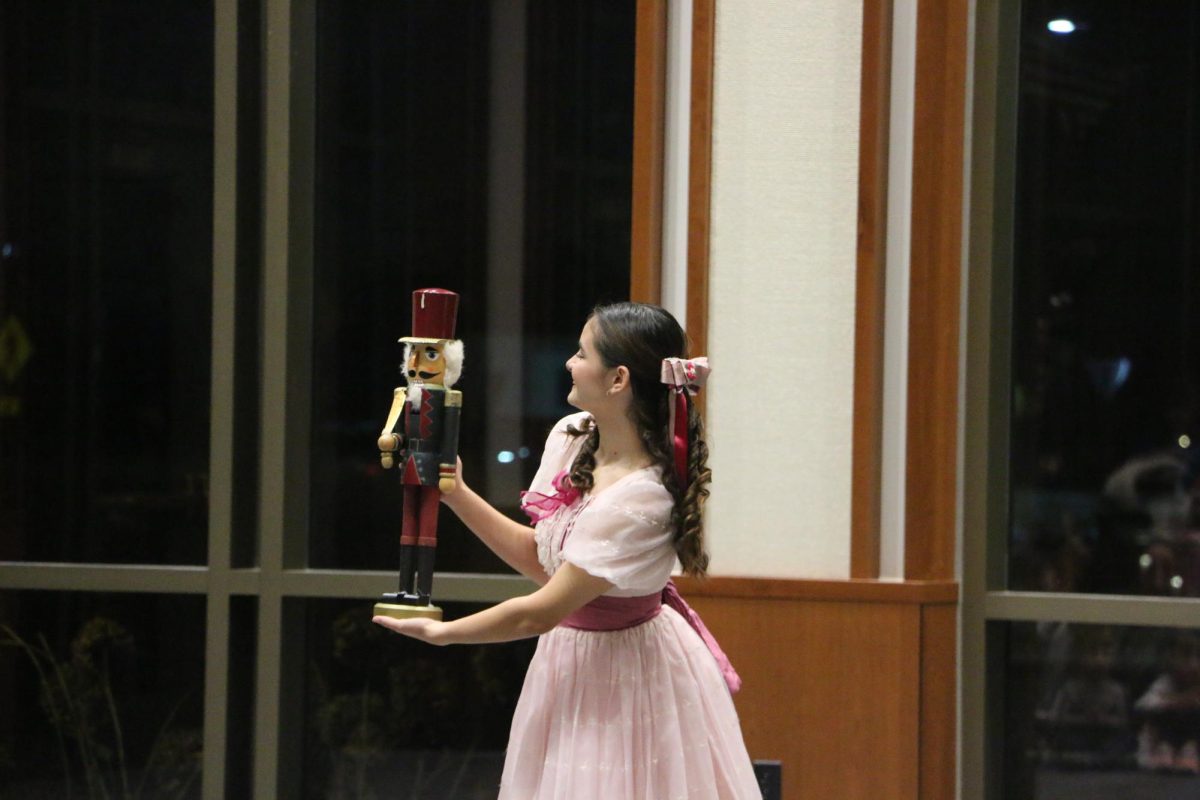A few years ago, junior Lars Medlin attended a Dungeons & Dragons (DnD) convention. At the convention, he had the chance to meet and talk to lots of different people, including an aerospace engineer that inspired his passion for astronomy.
“I’ve always been drawn to science. I’ve been interested in biology and how things work and why they work and I feel like space is one of those great things that we don’t know enough about,” Medlin said. “I think it’s a very interesting concept that if man can explore space in a way that’s not hurting space, I think that we can find some really interesting things to advance society.”
However, Medlin’s passion for astronomy doesn’t stop him from fearing he might choose the wrong path and end up regretting it later on.
“At the end of the day I want to be an astronaut, which requires a doctorate in natural science, so I want to do biology, but I don’t want to spend five years doing that and realize I don’t want this for my life,” he said.
Senior Sope Koya, who said she wants to become an OBGYN, said she agreed.
“Regretting things is one of my biggest fears,” she said via email. “I definitely want to make sure becoming a doctor is what I want to do before I go down the long medical field path.”
Work burnout and disengagement are becoming increasingly prevalent issues in today’s labor force, and arguably one that younger generations are trying to avoid. In 2019, Forbes revealed that workplace disengagement costs companies between $450 and $550 billion annually.
“I would say that it is very common for people to become disengaged at their jobs,” Tim Dugger, a local career coach, said via email. “Typically, the number one reason for that is feeling like they are not being heard, that their ideas and opinions are not being taken seriously or respected.”
While work disengagement might be concerning, Sneha Srivatsa, a senior who wants to become a lawyer, has a different perspective.
“I have come to accept that it is never too late to take a different route in life. The end goal, really, is to be happy with the life you have built,” she said via email.
Srivatsa also said some of her extended family members have changed careers later in life and finished graduate school in their 40s.
According to Dugger, this decision is not uncommon.
“I usually like to present people with two options if possible, one is working with their existing education to see what roles would be available to them without spending another dime on education,” he said. “And then second, what kind of careers or roles they could have if they were willing to go back to school.”
Srivasta said, “Personally, I have been certain of my path to being a lawyer since middle school, and I am a career-oriented person. But if things don’t go according to plan, I have faith that I will figure something out for myself in that situation and know that it is never too late to change career paths if I need to.”
Besides fear of burnout and disengagement, there are several key factors that influence career decisions. A 2019 analysis by the International Journal of Human Resource Studies (IJHRS) reported that personality, peer influence and parental influence all had a significant positive relationship with career choices.
Earlier this year, the HiLite conducted a career survey with 135 student respondents. Results from the HiLite survey were somewhat consistent with the findings from the IJHRS study.

Respondents ranked six factors–familial influence, peer influence, personality, current events, salary, and education required–on a scale of 0 to 5 (0 being that the factor had no influence on the respondent’s career decision and 5 being that the factor had a significant influence).
Results showed that peer influence had the least influence on students’ career choices, with only 5.2% of respondents ranking it as a 5, while personality had the most influence, with 53.3% of respondents ranking it as a 5 and 28.9% of respondents ranking it as a 4.
Dugger said he agreed that personality is the most important factor.
“I have used personality testing in my work for over 30 years and I strongly believe that people are wired or not wired to do particular careers based on their personality type,” he said.
Senior Ian Miller, who said he wants to become a clinical adolescent psychologist, also said his personality played a large role in choosing a career path.
“I would say that I’m an extrovert at times but can also be an introvert, and I feel like that helps me with connecting with others and empathizing with their issues,” he said via email.
Rankings for familial influence were more spread out, with 3 being the most prevalent (28.1%) and 4 and 2 closely following suit.
However, Medlin, Srivatsa, Miller, and Koya all said that they would pursue their respective career paths even without familial support, though it would be a difficult situation.
“I care for my family, but I also want to have a family of my own eventually. And I want to be able to fulfill my passion while making enough to take care of my family,” Medlin said. “I feel like when people don’t pursue their passions because their family is displeased with it, it’s really sad because you’re putting your family before yourself which is sometimes a good thing but at the end of the day it is your life.”
Dugger said he strongly agreed, and that choosing a path based on familial and peer influence is “usually one of the worst ways to pick a career.”
“Parents can sometimes focus on money and not happiness. Their child expresses interest in a career in music or art or theater and the parents’ response is ‘how are you going to make any money doing that?’ I consider that a horrible crime,” Dugger said. “If every parent behaved like this we would have no artists, or musicians, or poets, or dancers, or athletes, and what a sad world that would be.”
Furthermore, while the International Journal of Human Resource Studies did not recognize current events as a key factor, 23% of respondents ranked it as a 5, and 27.4% of respondents ranked it as a 4 in importance.
Koya said the systemic issues within the reproductive healthcare system motivated her to aspire towards becoming an OBGYN for marginalized women.
“As a woman of color myself, their issues matter immensely to me and I want to do as much as I can to make their health a priority in this country,” she said. “Childbirth especially can be extremely risky to women of color and I want to make sure I’m doing what I can to make the process as comfortable and safe as possible.”
Miller added that the current stigmas surrounding mental health made him realize it was a problem he wanted to get more involved in.
“I think that the acknowledgement of mental health is to some extent prioritized in schools and society however the stigmatization with mental health is still rampant and detrimental,” he said. “(It) creates a negative connotation associated with mental health and some adolescents feel like their voice can’t be heard or that they should be ashamed for how they feel and think.”
However, Dugger said he was somewhat skeptical of the importance of current events, pointing out that a career typically lasts several decades, making current events relatively unimportant in the long run.
In addition, Dugger advises high school and college students to see a trained career professional if they are unsure about the future.
“I would highly recommend parents and students contact a qualified career advisor. It’s a small investment compared to the tens of thousands of dollars that can be saved avoiding a wrong investment in a semester, a year, or more of education,” he said.
Overall, Dugger and Medlin agreed that following your passions is the best way to find the right path.
“At the end of the day,” Medlin said, “I’m just a nerd who wants to go into space.”




























![Keep the New Gloves: Fighter Safety Is Non-Negotiable [opinion]](https://hilite.org/wp-content/uploads/2024/12/ufcglovescolumncover-1200x471.png)
















































![Review: "Moana 2": Is the storyline just as intense as advertised? [MUSE]](https://hilite.org/wp-content/uploads/2024/12/1-copy-1024x538-1.webp)
![Review: Celebrating its 15th season, “Bob’s Burgers” renders itself a fan favorite [MUSE]](https://hilite.org/wp-content/uploads/2024/12/bobs-burgers-tv.jpg)
![Review: “Family By Choice” is the perfect watch that encapsulates family, love and everything in between [MUSE]](https://hilite.org/wp-content/uploads/2024/12/family-by-choice-1.png)
![Review: “A Phở Love Story” is an exceptional and authentic representation of teenage Vietnamese-Americans [MUSE]](https://hilite.org/wp-content/uploads/2024/12/a-pho-love-story-9781534441941_hr-786x1200.jpg)
![Review: “And the War Came” by Shakey Graves is the perfect year-round album [MUSE]](https://hilite.org/wp-content/uploads/2024/12/IMG_2665.jpeg)
![Review in Print: Maripaz Villar brings a delightfully unique style to the world of WEBTOON [MUSE]](https://hilite.org/wp-content/uploads/2023/12/maripazcover-1200x960.jpg)
![Review: “The Sword of Kaigen” is a masterpiece [MUSE]](https://hilite.org/wp-content/uploads/2023/11/Screenshot-2023-11-26-201051.png)
![Review: Gateron Oil Kings, great linear switches, okay price [MUSE]](https://hilite.org/wp-content/uploads/2023/11/Screenshot-2023-11-26-200553.png)
![Review: “A Haunting in Venice” is a significant improvement from other Agatha Christie adaptations [MUSE]](https://hilite.org/wp-content/uploads/2023/11/e7ee2938a6d422669771bce6d8088521.jpg)
![Review: A Thanksgiving story from elementary school, still just as interesting [MUSE]](https://hilite.org/wp-content/uploads/2023/11/Screenshot-2023-11-26-195514-987x1200.png)
![Review: "When I Fly Towards You", cute, uplifting youth drama [MUSE]](https://hilite.org/wp-content/uploads/2023/09/When-I-Fly-Towards-You-Chinese-drama.png)
![Postcards from Muse: Hawaii Travel Diary [MUSE]](https://hilite.org/wp-content/uploads/2023/09/My-project-1-1200x1200.jpg)
![Review: "Ladybug & Cat Noir: The Movie," departure from original show [MUSE]](https://hilite.org/wp-content/uploads/2023/09/Ladybug__Cat_Noir_-_The_Movie_poster.jpg)
![Review in Print: "Hidden Love" is the cute, uplifting drama everyone needs [MUSE]](https://hilite.org/wp-content/uploads/2023/09/hiddenlovecover-e1693597208225-1030x1200.png)
![Review in Print: "Heartstopper" is the heartwarming queer romance we all need [MUSE]](https://hilite.org/wp-content/uploads/2023/08/museheartstoppercover-1200x654.png)




